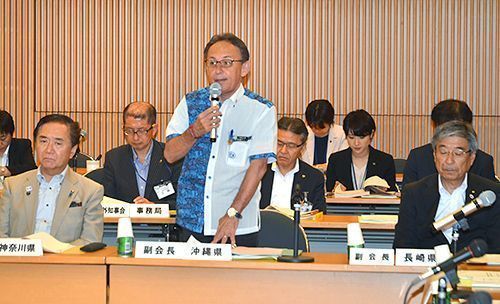The External Affairs Governor Committee demands clarification in SOFA for application of Japanese laws to U.S. forces in document delivered to Japan and the U.S. Embassy

Okinawa Governor Denny Tamaki greeting the External Affairs Governor Committee. July 31, at the Prefectural Assembly Hall, Chiyoda-ku, Tokyo
August 1, 2019 Ryukyu Shimpo
The “Coordination Committee for Principal Governors Engaged in External Affairs” (also called the External Affairs Governor Committee, Kanagawa Governor Yuuji Kuroiwa, chairman), which is comprised of the governors from the 15 prefectures that host U.S. military bases, visited the Ministry of Foreign Affairs (MoFA), the Ministry of Defense (MoD), and the U.S. ambassador to Japan to deliver written demands for base policies to reduce the number of bases as well as for revisions to the U.S. Japan Status of Forces Agreement (SOFA).
The demands regarding SOFA include the establishing of a new clause wherein the U.S. would be required to consult with Japan prior to conducting training outside of the base, as well as clarification for the application of Japanese law to resident U.S. forces such as aviation law.
In the regular general committee meeting prior to the demands, Okinawa Governor Denny Tamaki introduced an investigative report written by Okinawa about the Status of Forces agreements in other countries, where he explained that in four European countries that host the U.S. military, military personnel are subject to those countries’ domestic laws.
In his opening remarks, Tamaki noted the referendum vote in Okinawa on new base construction in the Henoko neighborhood of Nago in February this year, where Okinawans voted for against with an “overwhelming majority,” and commented, “The strong rebuke of land-filling activity in Henoko by the people of Okinawa was the first such display, and held great significance.”
According to Kuroiwa, who met with the press after delivering the demands, and said that Kiyoto Tsuji, parliamentary secretary at MoFA, said that SOFA was, “something that changes with the times, and must take a form that citizens can agree with.” Kenji Harada, vice-minister of defense, commented, “We would like to pursue this together in the way we should.” Kuroiwa said the answers, “Have not been more in depth than what we have received so far.”
Additionally, the renewed request for a liaison committee with the U.S. and Japanese governments as well as the External Affairs Governor’s committee received no further comment from both the MoFA and the MoD than “we would like to coordinate this.”
Governor Tamaki also received an answer on the base issues in Okinawa he cited in June from secretary Tsuji, who explained that they are revising the an agreement for using only parts that do not contain the organofluoric compound PFOS, and to reduce parachute trainings outside of Ie Island, as established in the SACO agreement.
The External Affairs Governor Committee has established that “Revisions to SOFA cannot be avoided,” and requests revisions to both the Japanese and U.S. governments annually.
This year’s requests included seven items mainly centered on the discretion allowed to the U.S. military such as “transparency for base usage,” and “establishing environmental clauses,” and raised 19 other revisions. Additionally, there were operational improvement requests such as respecting the wishes of the region for when conducting parachute training.
In the committee executive election, Kuroiwa was re-elected as chair, and three others including Tamaki were selected as vice-chairs.
(English translation by T&CT and Sam Grieb)
Previous Article:Tetsumi Takara expresses determination to block FRF construction on his first day in the Diet
Next Article:NIAC foreigner trend survey shows foreigners make up half of population increase, Chinese the largest foreigner group
[Similar Articles]
- Governor Tamaki requests U.S. military suspend transfer of personnel from the U.S. to Okinawa amid coronavirus outburst on U.S. bases
- Governors’ Organization makes special requests to Minister of Defense concerning the SOFA
- Kanagawa governor proposes disaster-related agreement with US military, but Onaga concerned it could lead to base fortification
- Japan determines U.S. contractors are also “employees,” in compensation case for murdered woman
- National Association of Chairmen of Town and Village Assemblies calls for revision of SOFA
 Webcam(Kokusai Street)
Webcam(Kokusai Street)


